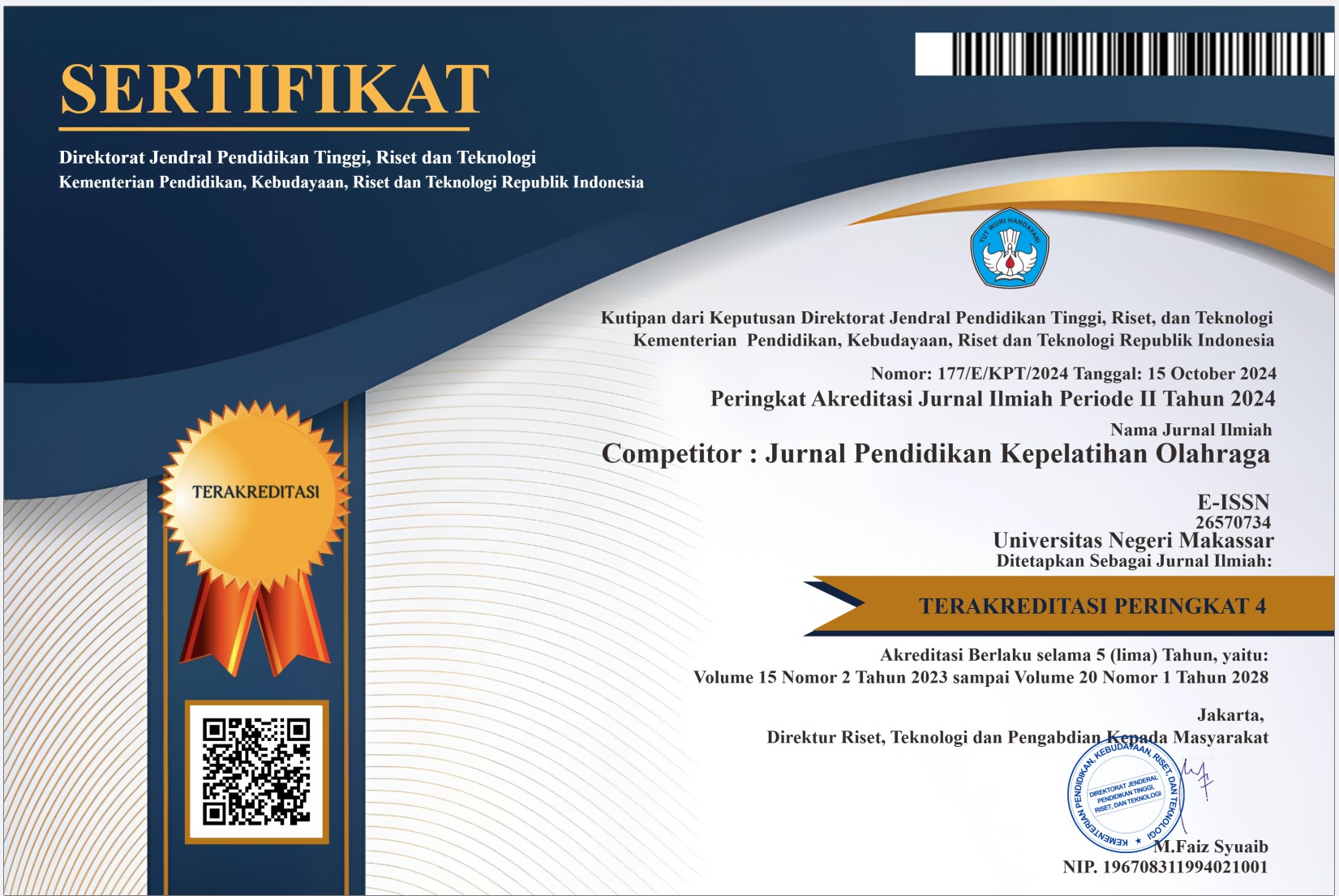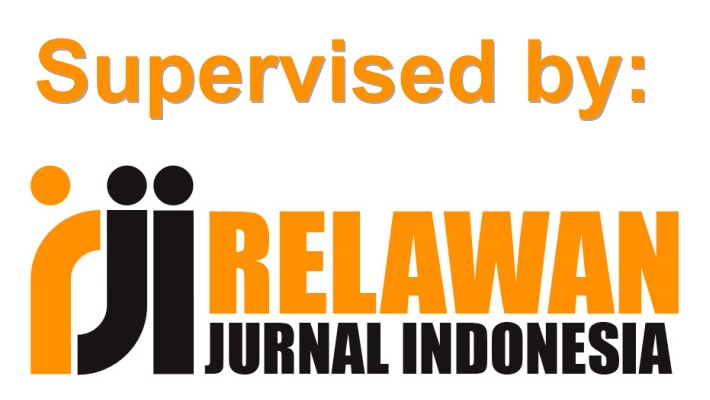The Effect of Pair Passing And Pass Give And Go Training On Football Passing Accuracy of Club P2D FC Muarangamu Players
DOI:
https://doi.org/10.26858/cjpko.v17i2.106Keywords:
Training; Pair Passing; Pass Give and Go; Passing Accuracy; FootballAbstract
This study began with the results of observations that had been conducted at the Muarangamu Village Football Field. It was found that there were still many players who did not have good passing skills; most players passed with the wrong technique. This study aims to determine the Effect of Paired Passing and Pass Give and Go Training. This study was conducted using a quasi-experimental method with a Two-Group Pretest-Posttest Design. The population in this study were 20 P2d FC Muarangamu Football Club Players, while the sampling technique used was Total Sampling, where all populations were sampled. The research design used a Pre-Test and Post-Test. The instrument used was the Passing Accuracy test. Data analysis and testing of research hypotheses used the independent t-test (t-test) analysis technique with a significance level of α = 0.05. The test results show that there is an Influence of Paired Passing Training and Pass Give End Go on Football Passing Accuracy. The hypothesis test shows a value (t count 4.813 > t table 1.860), so that it shows that Ho is rejected and Ha is accepted, which means that there is a significant Influence on Increasing Football Passing Accuracy after being treated with the Paired Passing Training Method and Pass Give End Go.
References
Ali, A., Williams, C., & Hulse, M. (2019). The impact of high-intensity training on technical skills in football. Journal of Sports Sciences, 37(5), 472–479. https://doi.org/10.1080/02640414.2018.1519442
Carling, C., Reilly, T., & Williams, A. M. (2014). Performance assessment for field sports. Routledge.
Clemente, F. M., et al. (2014). Small-sided games: An integrated approach to skill development in soccer. Journal of Sports Science and Medicine, 13(1), 27–35.
Clemente, F. M., Martins, F. M., & Mendes, R. S. (2016). Periodization based on small-sided soccer games: Theoretical considerations. Strength & Conditioning Journal, 38(1), 71–78. https://doi.org/10.1519/SSC.0000000000000186
Davids, K., Araújo, D., & Vilar, L. (2013). An ecological dynamics approach to skill acquisition: Implications for development of talent in sport. Talent Development & Excellence, 5(1), 21–34.
Ford, P. R., Yates, I., & Williams, A. M. (2010). An analysis of practice activities in youth football. Journal of Sports Sciences, 28(5), 483–495. https://doi.org/10.1080/02640410903582750
Gabbett, T., & Jenkins, D. (2017). Relationship between training load and injury in professional rugby league players. Journal of Science and Medicine in Sport, 10(6), 383–391. https://doi.org/10.1016/j.jsams.2006.08.004
Jones, S., & Drust, B. (2007). Physiological and technical demands of 4v4 and 8v8 games in elite youth soccer players. Kinesiology, 39(2), 150–156.
Lees, A., & Nolan, L. (2012). The biomechanics of soccer: A review. Journal of Sports Sciences, 20(10), 813–827. https://doi.org/10.1080/026404102320675421
Memmert, D., Baker, J., & Bertsch, C. (2010). Play and practice in the development of sport-specific creativity in team ball sports. High Ability Studies, 21(1), 3–18. https://doi.org/10.1080/13598139.2010.488083
Owen, A. L., Twist, C., & Ford, P. (2012). Small-sided games: The physiological and technical effect of altering pitch size and player numbers. Insight: The FA Coaches Association Journal, 15(2), 28–33.
Owen, A., Twist, C., & Ford, P. (2014). Small-sided games in football: Influence on technical and tactical performance. Journal of Human Kinetics, 41, 79–86. https://doi.org/10.2478/hukin-2014-0037
Práxedes, A., Moreno, A., Gil-Arias, A., Claver, F., & Del Villar, F. (2020). Effect of tactical training on decision-making and performance in youth football. Journal of Human Kinetics, 74, 219–228. https://doi.org/10.2478/hukin-2020-0025
Raab, M. (2014). Simple heuristics in sports. International Review of Sport and Exercise Psychology, 7(1), 104–120. https://doi.org/10.1080/1750984X.2014.885554
Rampinini, E., Impellizzeri, F. M., Castagna, C., Azzalin, A., Ferrari Bravo, D., & Wisloff, U. (2007). Effect of match-related fatigue on short-passing ability in young soccer players. Medicine and Science in Sports and Exercise, 39(5), 938–943. https://doi.org/10.1249/mss.0b013e3180409c77
Reilly, T., Williams, A. M., Nevill, A., & Franks, A. (2016). A multidisciplinary approach to talent identification in soccer. Journal of Sports Sciences, 18(9), 695–702. https://doi.org/10.1080/02640410050120078
Roca, A., & Williams, A. M. (2017). Expertise and the interaction between different perceptual-cognitive skills. Psychology of Sport and Exercise, 29, 62–70. https://doi.org/10.1016/j.psychsport.2016.11.004
Sarmento, H., Marcelino, R., Anguera, M. T., Campaniço, J., Matos, N., & Leitão, J. C. (2018). Match analysis in football: A systematic review. Journal of Sports Sciences, 36(6), 591–601. https://doi.org/10.1080/02640414.2017.1341123
Schmidt, R. A., Lee, T. D., Winstein, C. J., Wulf, G., & Zelaznik, H. N. (2019). Motor control and learning: A behavioral emphasis (6th ed.). Human Kinetics.
Williams, A. M., & Hodges, N. J. (2005). Practice, instruction and skill acquisition in soccer: Challenging tradition. Journal of Sports Sciences, 23(6), 637–650. https://doi.org/10.1080/02640410400021328
Williams, A. M., Ward, P., & Chapman, C. (2011). Training perceptual skill in field hockey: Is there transfer from the laboratory to the field? Research Quarterly for Exercise and Sport, 82(3), 423–432. https://doi.org/10.1080/02701367.2011.10599774
Williams, A. M., & Ford, P. R. (2013). Game intelligence: How anticipation and decision making are developed in expert performers. High Ability Studies, 24(1), 65–78. https://doi.org/10.1080/13598139.2013.780972
Wein, H. (2018). Developing game intelligence in soccer. Reedswain Publishing.
Yani, A., Ramadhan, A., & Saputra, Y. (2020). Football training model development for youth clubs in Indonesia. Jurnal Keolahragaan, 8(2), 123–132. https://doi.org/10.21831/jk.v8i2.31861
Downloads
Published
Issue
Section
License
Copyright (c) 2025 Hermen Ashari, Lolia Manurizal (Author)

This work is licensed under a Creative Commons Attribution 4.0 International License.



















